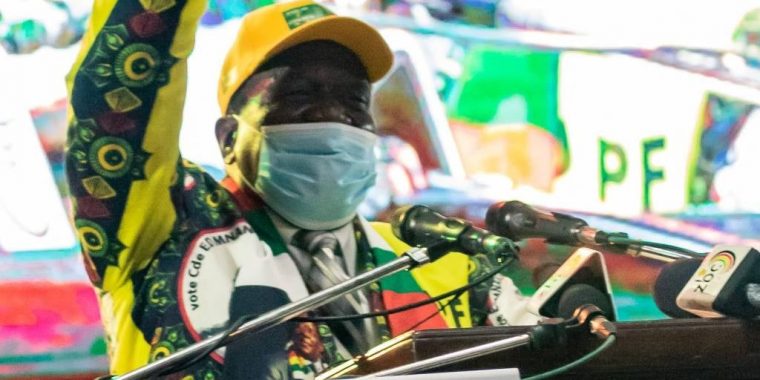
Emmerson
Mnangagwa
salutes
party
supporters
at
the
Zanu-PF
elective
congress
in
Harare.
PHOTO:
Jekesai
Njikizana,
AFP
-
The
MDC
Alliance
has
failed
to
pay
nomination
fees
for
its
parliamentary
candidates. -
Zanu-PF
is
plotting
a
court
challenge
on
the
eligibility
of
CCC
parliamentary
candidates
in
Bulawayo. -
There
are
two
arrest
warrants
and
a
court
challenge
against
independent
presidential
hopeful Saviour
Kasukuwere.
Lawfare
and
slip-ups
by
the
opposition
in
Zimbabwe
are
presenting
Zanu-PF
with
an
early
advantage
ahead
of
the
23
August
general
elections.
Already,
Zanu-PF
is uncontested in
53
local
council
authorities
where
the
opposition
failed
to
field
candidates.
The
party’s
national
political
commissar,
Mike
Bhima,
told
News24:
“So
far,
so
good.
We’re
leading
all
the
way.”
The
MDC
Alliance,
led
by
Douglas
Mwonzora,
did
not
field
candidates
in
all
constituencies
after
it failed to
pay
the
candidate
nomination
fees.
Thereafter,
the
party
filed
a
case
at
the
Constitutional
court,
where
Justice
Webster
Chinamora
ruled
“the
nomination
papers
were
not
in
order
by
virtue
of
the
failure
to
pay
the
nomination
fees”.
Nomination
fees
for
parliamentary
candidates
were
pegged
at
R18
300
(US$1000)
while
the
presidential
fee
is
R366
000
(US$20
000).
Zanu-PF
paid
for
all
its
candidates,
while
Citizens
Coalition
for
Change
(CCC)
candidates
raised
theirs.
Zanu-PF
said
those
who
failed
to
pay
the
nomination
fees
had
no
business
running
a
country.
Mwonzora
told
the
media
he
failed
to
pay
nomination
fees
for
his
candidates
because
the
Zimbabwe
Electoral
Commission’s
(ZEC)
payment
platform
was
down.
But
he
managed
to
pay
his
fees
for
the
presidential
election.
This
leaves
Zanu-PF
to
face
off
against
the
CCC
in
most
of
the
parliamentary
seats.
If
Zanu-PF
has
its
way,
the
CCC’s
parliamentary
candidates
could
be
disqualified
in
Bulawayo
–
one
of
its
strongholds.
Zanu-PF’s
finance
secretary,
Patrick
Chinamasa,
said
the
ruling
party
would
seek
to
have
15
CCC
candidates
disqualified
because
they
were
not
in
court
with
signed
nomination
papers
and
nomination
fees
by
the
time
the
Nomination
Court
closed
at
16:00
on
21
June.
Zanu-PF
compiled
a
timeline
that
showed
the
15
candidates
arriving
at
the
Nomination
Court
between
17:00
and
midnight.
The
CCC’s
lawyer,
Thabani
Mpofu,
said
in
a tweet Zanu-PF
was
using
a
strategy
that
fell
flat
last
week
in
Harare
at
the
Nomination
Court
when
the
ZEC
intended
to
disqualify
CCC’s
candidates.
He
added
it
was
the
same
argument
he
forwarded
to
the
legal
team
in
Bulawayo
to
allow
the
CCC
candidates
to
file
their
papers.
Mpofu
said
the
public
should
“take
note
of
the
chosen
route
[courts]”
by
Zanu-PF
to
discredit
the
CCC.
Presidential
aspirant
Savior
Kasukuwere,
a
former
senior
Zanu-PF
candidate,
was
also challenged by
Zanu-PF
activist
Lovedale
Mangwana
in
court.
His
argument
is
that
Kasukuwere
had
been
out
of
the
country
for
more
than
18
months.
High
Court
judge
Justice
David
Mangota
has
since
deferred
the
case
to
12
July.
Kasukuwere
also
has two
warrants
of
arrest hanging
over
him.
The
first
was
for
absconding
court
in
2019,
facing
four
charges
of
abuse
of
office
when
he
was
minister
of
local
government,
public
works
and
national
housing
in
the
late
Robert
Mugabe’s
Cabinet.
But
the
State
proceeded
to
confiscate
a
mansion
in
Inyanga
belonging
to
him.
The
other
warrant
of
arrest
was
for
Kasukuwere’s
failure
to
surrender
his
passport
to
the
clerk
of
court
after
travelling
out
of
the
country.
His
team
argued
it
was
all
part
of
threats
to
keep
him
away
from
coming
into
the
country
to
contest
for
the
presidency.

